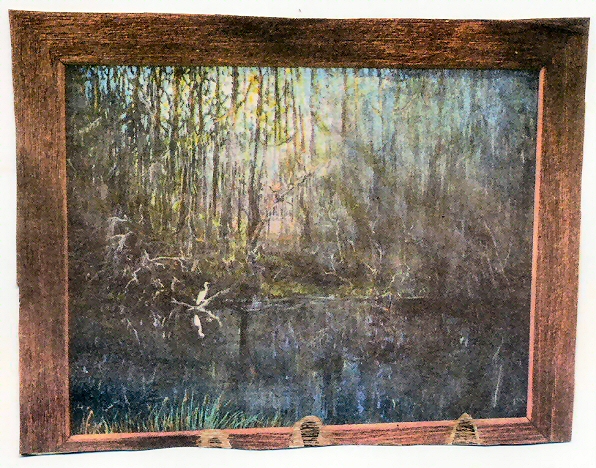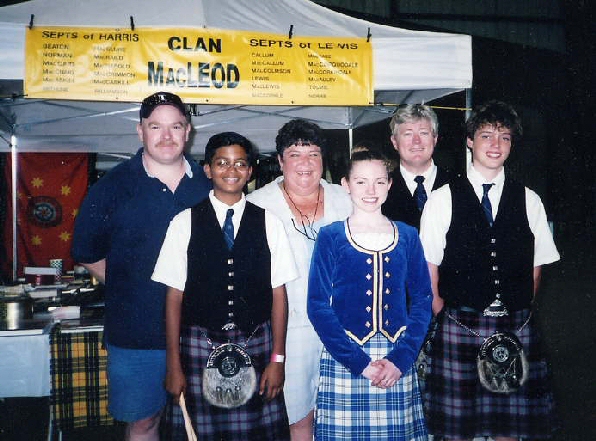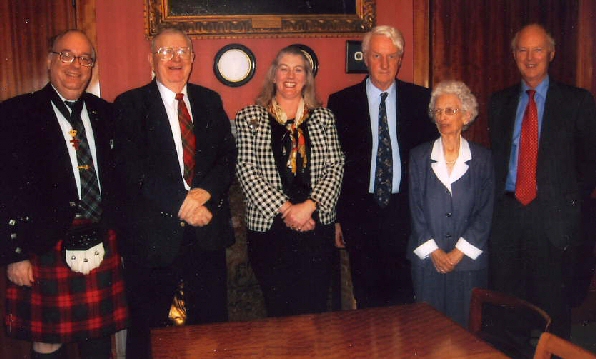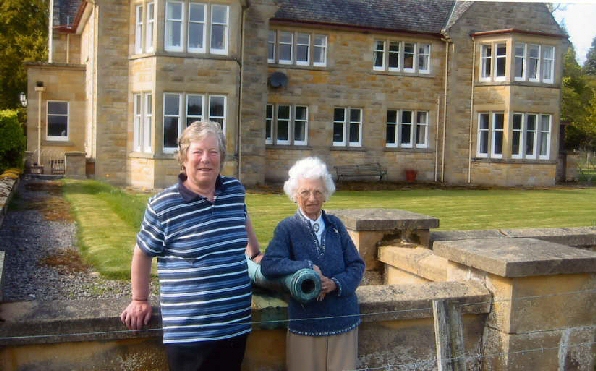|
L. Brown, Jr., Ridgewood, New Jersey,
member of Clan Pollock since 1990. Mr. Brown was a consultant. Our
sympathy to his wife, Violette Brown.
William P. Polk, Lexington, Oklahoma, member of Clan Pollock since
2000. Born in 1939, he was a deputy sheriff. Our sympathy to his wife,
Margaret Polk.
Thomas F. Pollock, Monrovia, California, member of Clan Pollock since
1992. Born in 1911, he was a retired Navy Captain. Our sympathy to his
wife, Olive Pollock.
Mrs. Margaret Pollock, Belvidere, Illinois, wife of Clan Pollock member,
Nevin C. Pollock. Our sympathy to Mr. Pollock.
The time it took to come to America
68 days Rotterdam to Baltimore in 1824
58 days Bremen to Baltimore in 1832
44 days Bremen to Baltimore in 1834
66 days Bremen to New Orleans in 1843
47 days LeHarve to New Orleans in 1854
>From 1867 to 1890, most sailing ships used steam auxiliary engines on
days when there was little or no wind. Many sailing ships did remain in
service, and fares were often lower than the faster steamships. In
1893, a steamship made it’s trip from Ireland in only 10 days.
Source: Lake Havasu Genealogical Society, Inc. Newsletter, PO Box 953,
1750 North McCulloch Blvd., Lake Havasu City, Arizona 86405-0953.
Here’s an explanation of the Mac, Mc and M’
“Mac,” Gaelic for “son,” is the most common element of Scottish
surnames. “Mc” is always an abbreviation of “Mac.” It also used to be
abbreviated as “M”, although this spelling is now not common. In an
early book on Highland music, the author spelled his own name three
different ways on the first pages: “MacDonald”, “McDonald”, and
“M’Donald”.
“Mac” is always considered an addition to a name. Before there was a
“Donald’s Son” there was a “Donald”. In Scotland, names beginning with
“Mac” are traditionally alphabetized under the first letter of the
second name - “MacAllister” under “A”. “MacZink” under “Z”.
After 1745, to avoid reprisals, many Scots anglicized their names by
dropping the “Mac”. They sometimes did so as they emigrated (were
cleared off land). “MacBall” simply became “Ball”. Nova Scotia’s
Kinzie River was settled by the MacKenzies.
“Mac” takes a variety of pronunciations. In Islay Gaelic, “Mac” is
pronounced like “mek”. In the United States, it can be herd as “mick”.
Preceding a “k” or “g” sound, the final “k” of “mac” disappears. It
became the practice in the south of Scotland to write two words as one
(MacHam as Machan; MacGrath as Magrath). The “k” sound of “Mac” is
duplicated and attached to the front of a following word if it begins
with a vowel, such as “MacAsh” to MacCash”. This may explain why some
“MacArthurs” hear themselves called “MacCarthers”. If the second name
begins with a “k” or “g” creating two “k” sounds together, one may
disappear (“MacKintosh” to “Macintosh” or “MacKaski” to “MacAskill”).
“Mac” at times is pronounced as “Muck” and written that way as
“Mac’llRoy” to “Muckleroy”.
Our thanks to Lake Havasu Genealogical Society, Inc. Newsletter, PO Box
953, 1750 North McCulloch Blvd., Lake Havasu City, Arizona 86405-0953.
Glasgow named world’s Intelligent Community of the Year
Glasgow was named as the world’s Intelligent Community of the Year in a
prestigious international awards ceremony on Friday, June 11th, which
recognizes the pioneering cities and regions of the digital age.
The city’s efforts to exploit technology for the benefit of its people
and businesses has been recognized by the New York-based Intelligent
Community Forum (ICF), a non-profit think-tank that researches the
impact of broadband and information technology on economic growth at
local level.
Each year the award is made to a city, region or community with a
documented strategy for creating a digital age economy that uses
broadband information and communications technology to advance its
competitiveness.
Glasgow, whose bid was compiled by Scottish Enterprise (SE) Glasgow and
Glasgow City Council, fended off competition from six other cities
including Spokane, Washington (USA); Sunderland, England (UK); Taipei,
Taiwan; The State of Victoria, Australia; Western Valley Region, Nova
Scotia (Canada); and Yokosuka, Japan.
Gordon Kennedy, deputy chief executive of SE Glasgow, who was in New
York to accept the award, said: “To receive this award is a tremendous
achievement and one that will serve to place Glasgow on the world stage
as a city committed to taking full advantage of the opportunities
presented by technology.”
Each year the ICF selects its Intelligent Community of the Year, based
on a variety of measures including deployment of broadband, building a
knowledge-based workforce, bridging the digital divide, encouraging
innovation and effective economic development marketing.
Bailie Alan Stewart of Glasgow City Council said: “It was a fantastic
achievement for Glasgow to be put on an international shortlist of seven
for the award of Intelligent Community of the Year and the fact that we
have taken the prize in the face of such still competition is tremendous
news.
Glasgow is a city with a rich history of innovation and of adapting to
change, and these are crucial requirements in the 21st century.”
For more information, visit <http://www.scottish-enterprise.com>.
Source: The Argent Castle Newsletter, Clan MacCallum/Malcolm Society,
3313 Dana Drive, Minnetonka, Minnesota 55305.
U.S. President Ford’s first name was...?
U.S. President Gerald R. Ford was born Leslie Lynch King, Jr. on July
14, 1913. His parents separated when he was just two weeks old. In
1916, Ford’s mother remarried to Gerald R. Ford, a Grand Rapids,
Michican paint salesman. The Fords began calling her son Gerald R.
Ford, Jr., although his name was not legally changed until 1935.
Our thanks for this article goes to Grip Fast, newsletter of the Clan
Leslie Society International, PO Box 845, Jackson, New Jersey 08527
Try this brain teaser in your spare time!
This is the sort of puzzle that keeps me awake nights.
Nicolas Dutoit, son of Francois Dutoit, married in 1585 to Louise,
daughter of Antoine Pache at Moudon, Switzerland. The marriage contract
was recorded by a local notary, and still survives. It mentions several
family relationships:
* Nicolas, the groom, had an uncle, Jaques Dutoit, who was present.
Jaques was the son of Claude Dutoit.
* Jaques Dutoit refers to the groom as his nephew, but he also refers
to the bride as his sister-in-law.
What’s going on here? Can you work out all the relationships between
these parties?
Solution to the brain teaser!
At first, I thought the marriage contract must be in error. How could
Jaques be the uncle of the groom and the brother-in-law of the bride at
the same time? I kept digging, and eventually figured out that Jaques
and his nephew Nicolas Dutoit had married the Pache sisters, Marie and
Louise, respectively. Louise, wife of Nicolas Dutoit, was therefore the
sister-in-law of Jaques Dutoit. Because of these relationships, I now
understand that Nicolas was the son of the Francois Dutoit who was the
son of Claude, and not the Francois who was the son of Claude’s brother
Pierre Dutoit. Thus, there were two Francois Dutoit’s who were first
cousins.
Source: Questing Heirs Genealogical Society, Inc. Newsletter, PO Box
15102, Long Beach, California 90815-0102.
Visit these interesting web sites
The U.S. National Archives has put up a new database of nine million
people who enlisted in the Army in World War II. Please be aware that
it is not complete. The database is called: World War II Electronic
Army Serial Number Merged File. When you get there, pull down the
subject search menu to “World War 1939-1945,” then click “submit.” For
more information about the database see: <http://www.archives.gov/aad/whats_new.html>.
Access to Archives (A2A) is a useful resource for family historians
looking for references to their ancestors in catalogues of the Archives
held in record offices and other places in England. Among other things,
it includes naturalizations, denizations, and material from some of the
more important “peculiar” jurisdictions. This is already a major site,
and should become even more useful in the future. Visit <http://www.a2a.org.uk/>.
One of the wonderful things about the web is that every once in a while
you can still come across something that just blows your mind with its
simplicity and usefulness. Linkpendium <http://www.linkpendium.org>
is one of those sites. Imagine having links to all the best genealogy
sites listed on a single page by geographic location, and then sorted
under such headers as: Cemeteries, Census Records and Indexes,
Directories, Genealogies, History, Libraries/Museums/Archives, Lookups,
Lists/Boards, Maps/Gazetteers, Projects, Societies, Surnames, and Vital
Records. The pages even have a link to the Cyndi’s list page for that
country.
I’m not really sure what I like best about this site: the sheer number
of links, the useful way in which they are presented, or the clean
interface, which has no advertising, other than a blurb at the top
asking users to spread the word about the site. It makes me yearn for
the days when the web was for information, not for selling things. It
is so refreshing to be able to work without being constantly bombarded
with distracting flashing ads.
Here is some more information directly from the Linkpendium site:
Linkpendium is being developed by Karen Isaacson and Brian Leverich,
founders of the extremely popular RootsWeb genealogical community site.
At the time of its merger with Ancestry in June 2000, RootsWeb had about
600,000 registered users, was serving about 100,000,000 web page views
monthly, and was delivering about 160,000,000 pieces of email monthly to
the subscribers of its 18,000 mailing lists. Linkpendium’s first public
facilities are in production now, and they expect to be rolling out
further functionality at a rapid pace.
Source: Questing Heirs Genealogical Society, Inc. Newsletter, PO Box
15120, Long Beach, California 90815-0102.
If you are related to either of the following Veterans, please contact
Gail Hughes, 180 Gary Lane, Adel, Georgia 31620.
Revolutionary soldier WILLIAM HUNTER. PRIVATE HUNTER was born in
Barnwell County, South Carolina, and died in 1857 in Brooks County,
Georgia, at the age of 107. His wife, CATHERINE DeLOACH died on the
same day. Children: NANCY HUNTER married DANIEL HIERS, WILSON HUNTER
married ELIZABETH HUGHES, KEZIAH HUNTER married PHILLIP HIERS, JACOB B.
HUNTER, HENRY L. HUNTER, KATHERINE HUNTER, ABIGAIL HUNTER married JACOB
H. CROFT, SUSAN HUNTER married LEVI SHAW, SARAH ANN HUNTER married
GEORGE CROFT.
Indian War Veteran PENNYWELL FOLSOM. FOLSOM was born in 1810 in Pulaski
County, Georgia; married POLLIE McLEOD and was killed in the Battle of
Brushy Creek. Children: CHLOE ANN FOLSOM married McKEEN GREEN McCALL,
BRYANT FOLSOM married NANCY JOHNSON, EMILY FOLSOM married GEORGE
CLIFTON, EDITH FOLSOM married JAMES D. SMITH.
Here’s an easy way to figure out cousinship
Count the number of “g”s in “grandmother,” “great-grandmother,” or
“great-great grandmother.” And so on. If you have a relative who’s
related to you through great-great-great grandmother Emmaline, just
count the “g”s. That would mean there are four “g”s in
great-great-great-grandmother. And that would mean you and your
relative are fourth cousins.
Now, if Grandma Emmaline is your great-great-great-grandmother, and
your cousin’s great-great-grandmother, you would take the lesser number
to determine “cousin.” Meaning, you are third cousins. (Remember,
count the “g”s.) The difference between the two numbers of four “g”s
and three “g”s would designate “removed.” So, that would mean you are
third cousins, once removed.
Wasn’t that easy? Wouldn’t YOU
like to own this beautiful painting?
Artist William S. Randles of Orlando, Florida, has donated a painting of
a beautiful Florida scene to The Family Tree to be used as a
fundraiser! You may help this online publication and have an
opportunity to own this lovely picture at the same time!
To enter the drawing, you will need to make your own entry slips...just
write your name, mailing address and phone number on as many bits of
paper as you’d like. The chances are $5.00 each or five for $20.00.
Enclose a check for the amount with your entry slips in an envelope and
mail it to Painting, PO Box 2828, Moultrie, GA 31776-2828. We’ll have
the drawing in time for this coming Christmas!
The painting is valued at about $300.
William Stephans Randles grew up in upstate New York and began studying
art at an early age. He entered the United States Air Force in 1952 and
retired in 1972. He then spent three years studying in the Fine Arts
Department at Ringling School of Art in Sarasota, Florida, graduating
with honors. After Ringling, Mr. Randles had a twenty year career with
Walt Disney World near Kissimmee, Florida.
He is married to Frieda and the couple will celebrate their Golden
Wedding Anniversary next year. They have five children and four
grandchildren. He is a Mason and a Shriner and active in the Scottish
community. His art has been sold and shown in several states.

Houston Highland Games, May 15, 2004: (back) Gordon Sampson, band
director; Diane Krugh, dance director; and Michael Cusack, band
director; Staff of St. Thomas Episcopal School - Scottish Arts. (front)
Brian Matthews, Carla Gardner and Joseph Doyle, winners of the Dunvegan
Foundation Scholarships for drumming, dancing and piping, respectively.

Dunvegan Foundation Scholarship Awards at St. Thomas Episcopal School,
Houston, Texas
The Dunvegan Foundation of The Clan MacLeod Society, USA, Inc., made
their annual scholarship awards to deserving students of St. Thomas
Episcopal School in Houston at the 33rd Houston Scottish Highland Games
and Festival on May 14, 2004.
The winners of the 2004 awards were Brian Matthews, drumming; Carla
Gardner, dancing; and Joseph Doyle, piping. These students are members
of the St. Thomas Episcopal School Pipe Band, which has been recognized
as one of the premier pipe bands in the United States and three-time
winner of the Juvenile World Pipe Band Championship. The A band will
travel to Scotland in August to compete in various competitions and
championships. Carla Gardner, the winner of the dance scholarship from
the Dunvegan Foundation, is the current 13-and-under champion at the
U.S., North American and Scottish Championships. She was third
runner-up at the Juvenile World Championship, placing first in the
Highland Fling.
This outstanding Scottish Arts program is under the direction of Michael
Cusack, piping; Gordon Sampson, drumming; and Donna Cusack and Diane
Krugh, dancing directors. The Clan MacLeod Society and the Dunvegan
Foundation are proud to be associated with the St. Thomas Episcopal
School and its fine staff.
Special visit to office of Lord Lyon during the annual general meeting
of the Scottish Tartan Authority, May 2004: (left to right) John Abbot
Cope, vice president, TECA/IATS; Chuck Bearman, president, TECA/IATS;
Mrs. C. W. (Elizabeth) Roads, MVO, Carrick Pursuivant of Arms, Lyon
clerk and keeper of the records; Sir Crispin Agnew, Rothe Say Herald;
Alta Bearman, past registrar; Robin Orr Baird, EVO, Lord Lyon, king of
arms.

Celia Mackintosh of Mackintosh (left) and Alta McIntosh Bearman with May
Hall in the background. The cannon goes back to the chief who had
merchant shipping, when he became chief after the War of 1812. The
ship’s name was “The Nancy.”

Did you really find the boney one?
Eugene M. Stevens of Wicomico, Virginia was right!!! If you looked high
and low for the boney one in the June/July paper issue of The Family
Tree and didn’t find him, then you were right also. Mr. Stevens said it
just wasn’t in the paper, and he was right! Some how and in some way,
the boney one fell off the layout sheet before the paper was printed.
However (and this is hard to explain), “old boney” did show up in the
on-line edition!!! (Look for him! He’s on page 22B on The Caledonian
Kitchen ad!)
But we still picked winners. They were selected from all the postcards
we received for the past two months. Congratulations, y’all!!!
W. H. Wharton, LaPlace, Louisiana won the Bennett Celtic Art. The Carl
Peterson CD went to Edward and Lila Williams of Klamath Falls, Oregon.
Jimmie D. McSween, Dallas, Texas won the Bonbright Dog Collar. Good
tasting Haggis was won by Patricia H. Engst, Centralia, Missouri. And
Scottie Dog Blackboards made by the Moultrie High School woodworking
class and decorated by the Moultrie-Colquitt County Library volunteers
were won by Helen Montague of Jacksonville, Florida, and Beth Cavender
of Eton, Georgia.. Reunion magazine subscriptions went to Laura
Fleschsig, Montgomery, MA; Joseph C. McKenzie, Bethel, CT; Catherine A.
Coberly, Winchester, VA; Claire Maertens, Kailua, HI; Eugene M. Stevens,
Wicomico, VA; Nina L. Ronshausen, Salem, OH; Jim Hardin, Pittsburgh, PA;
Craig Paras, Carmichael, CA; Margaret Hume, Delhi, NY; and J. L. Tucker,
Royal Oak, MI. |

